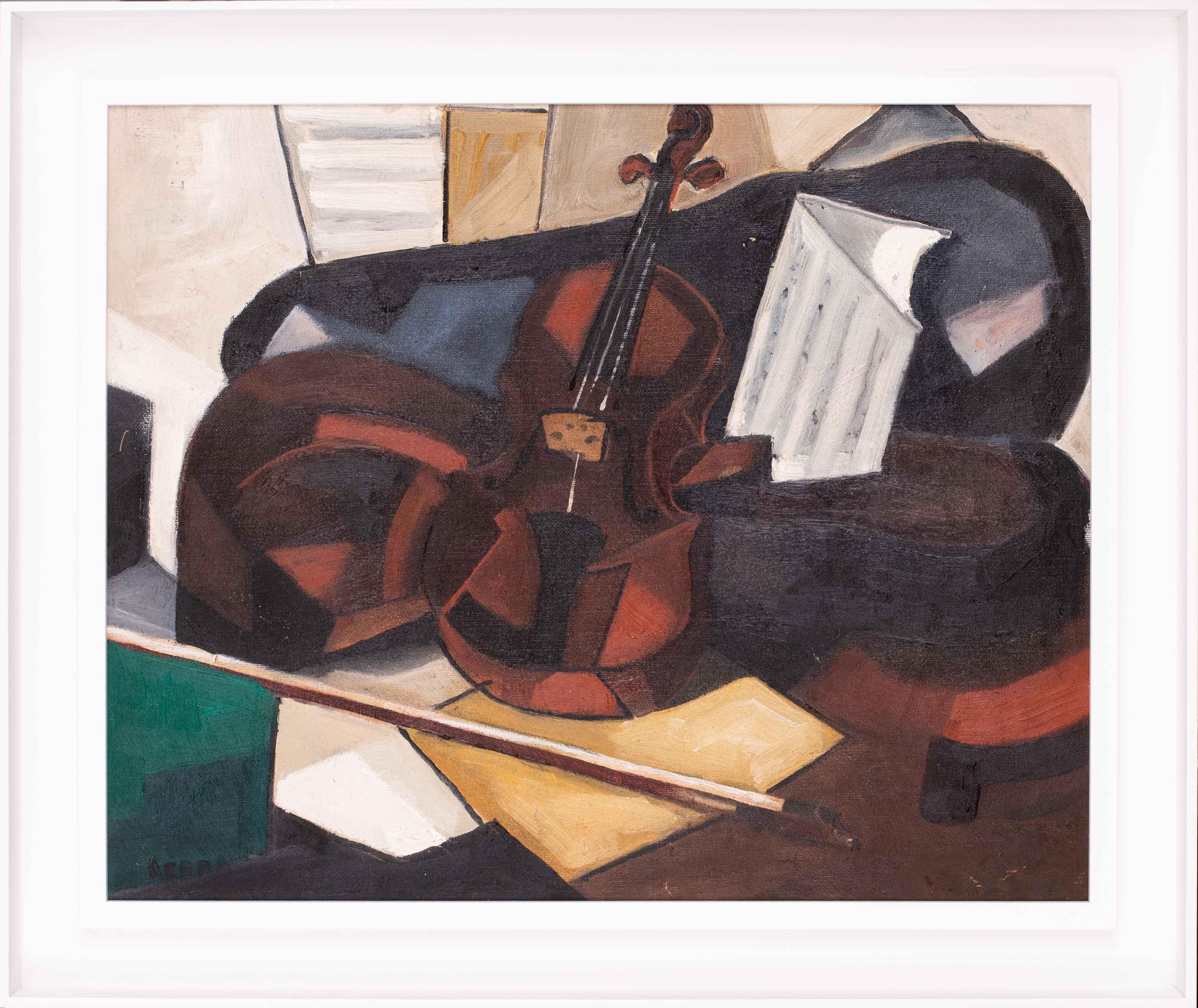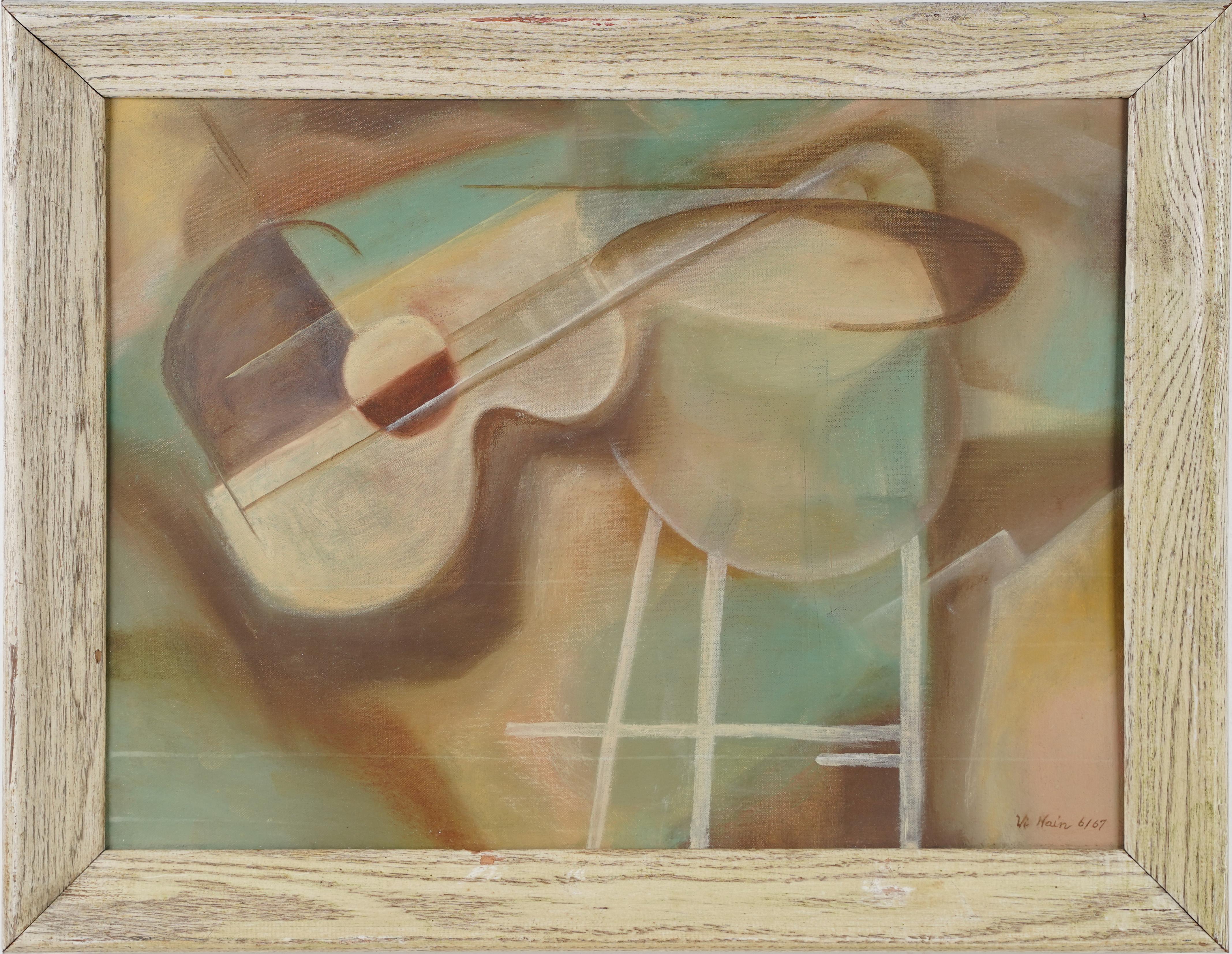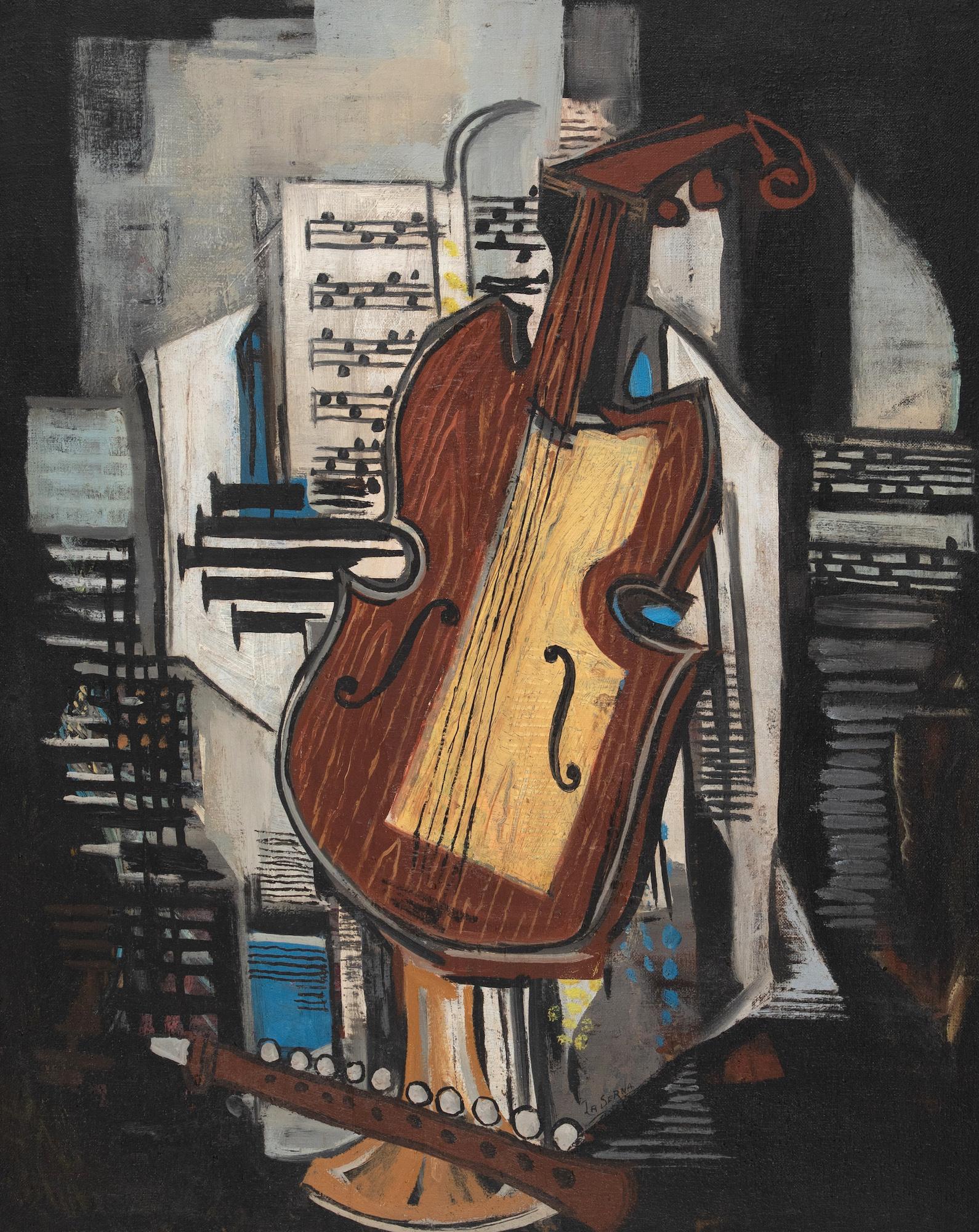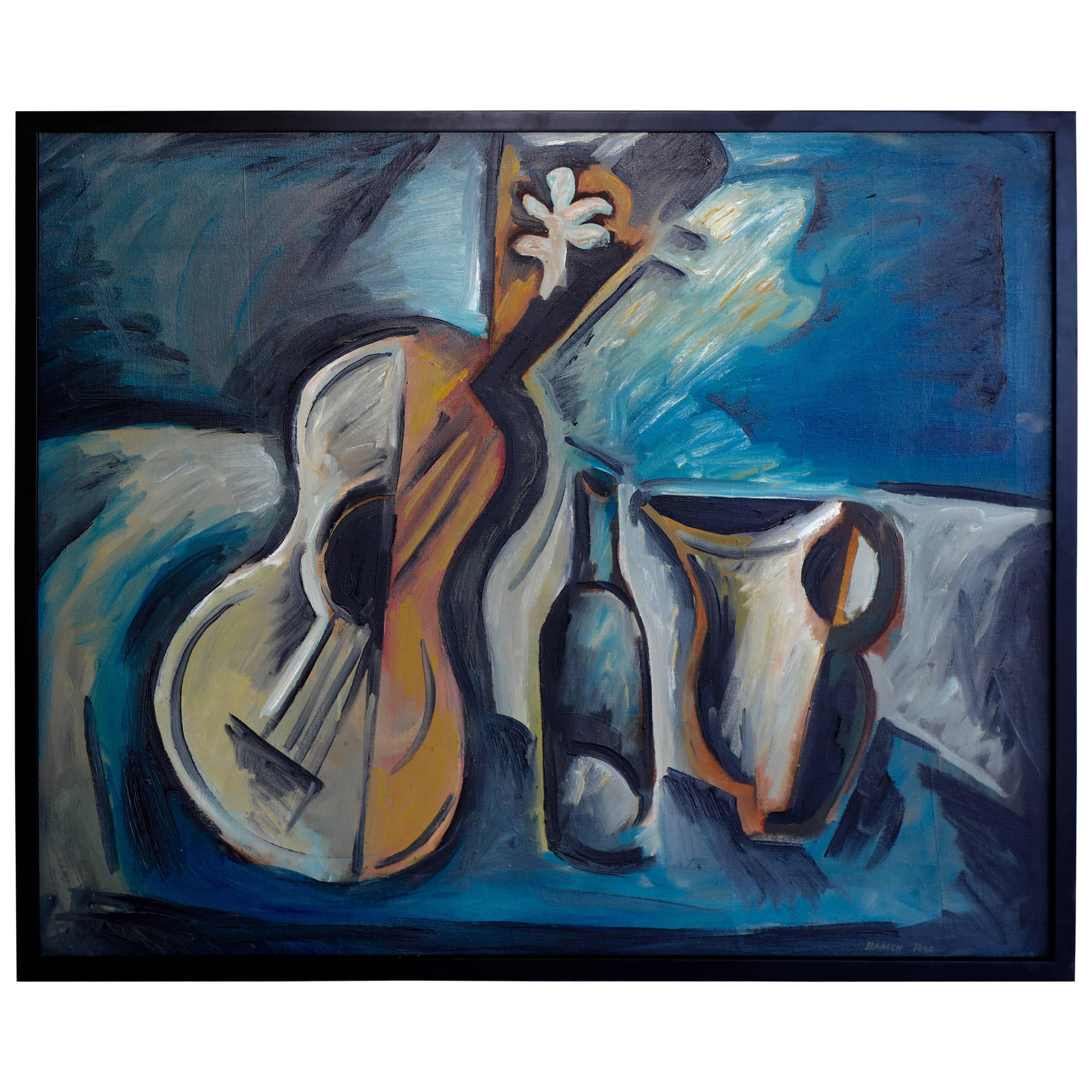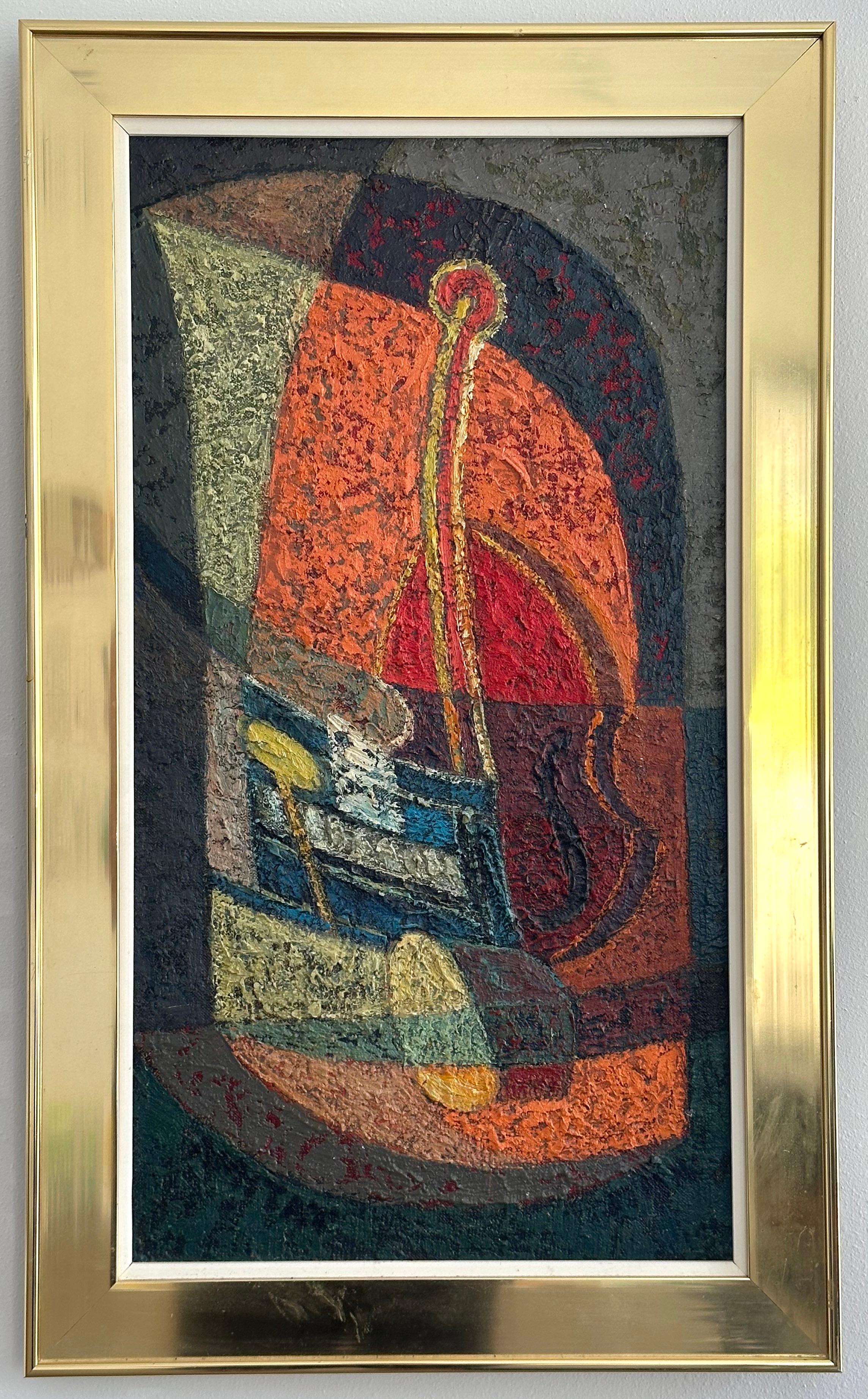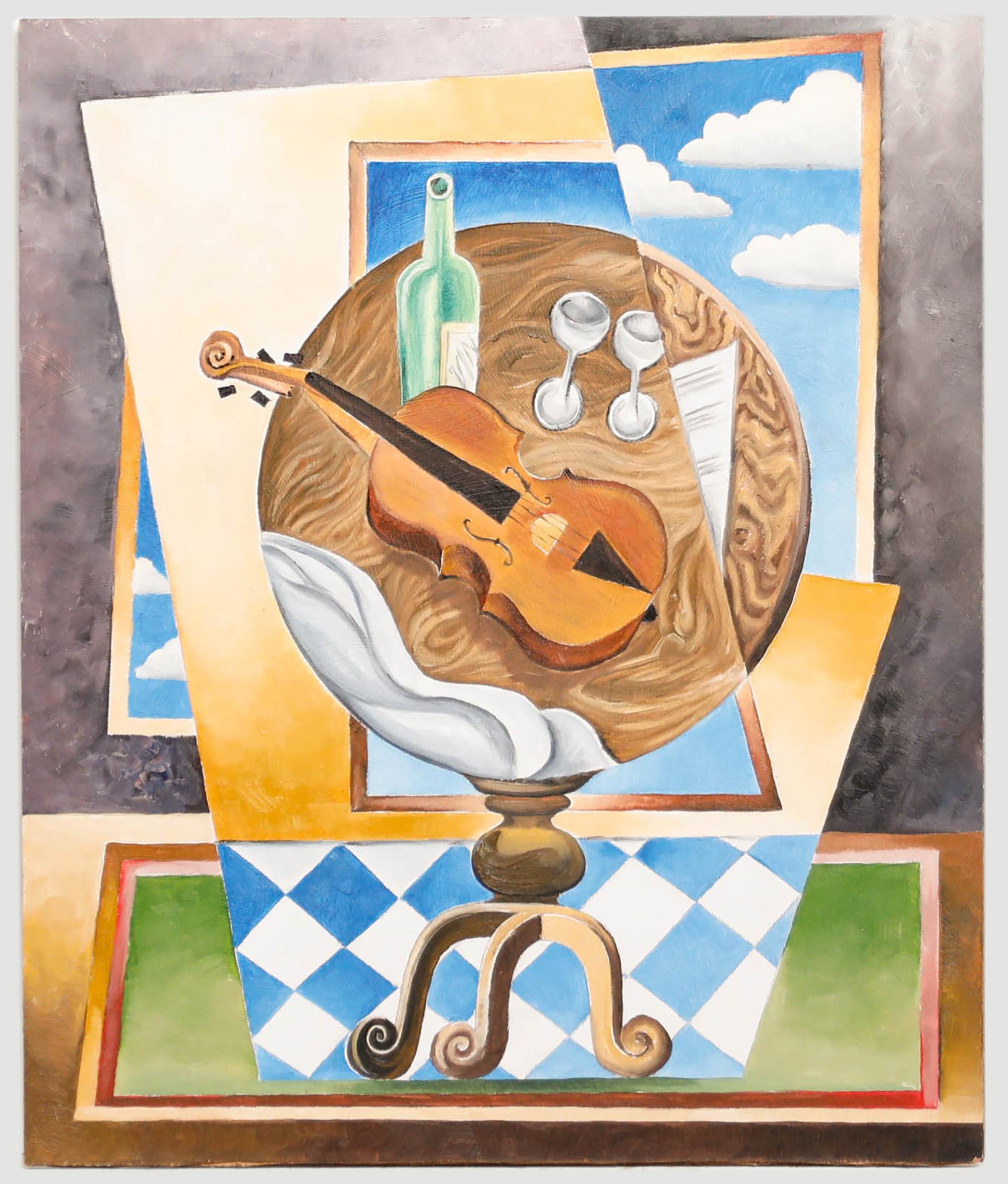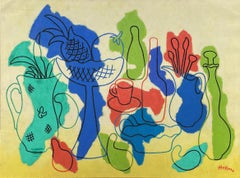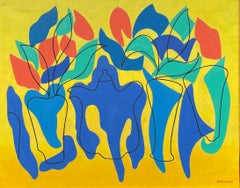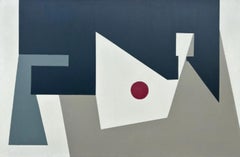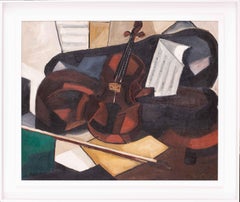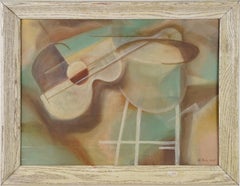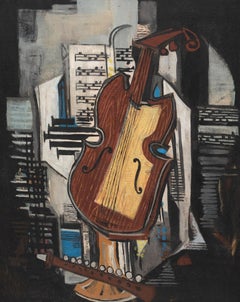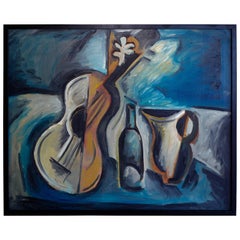Items Similar to "Nature morte" Bela de Kristo, Mid-century Cubist Still Life Abstract Cello
Want more images or videos?
Request additional images or videos from the seller
1 of 9
Bela De Kristo"Nature morte" Bela de Kristo, Mid-century Cubist Still Life Abstract Cellocirca 1956
circa 1956
$8,000
$10,00020% Off
£6,202.96
£7,753.7020% Off
€7,038.42
€8,798.0320% Off
CA$11,467.66
CA$14,334.5720% Off
A$12,469.44
A$15,586.8020% Off
CHF 6,570.18
CHF 8,212.7220% Off
MX$151,467.55
MX$189,334.4420% Off
NOK 82,600.42
NOK 103,250.5220% Off
SEK 77,431.22
SEK 96,789.0220% Off
DKK 52,817.23
DKK 66,021.5420% Off
About the Item
Bela de Kristo
Nature morte, circa 1956
Signed lower right
Oil on board
19 5/8 x 11 3/4 inches
Provenance:
Alexander Kahan Fine Arts, New York
Private Collection, New Jersey (acquired from the above)
About the Seller
5.0
Platinum Seller
Premium sellers with a 4.7+ rating and 24-hour response times
Established in 2022
1stDibs seller since 2022
127 sales on 1stDibs
Typical response time: 1 hour
- ShippingRetrieving quote...Shipping from: New York, NY
- Return Policy
Authenticity Guarantee
In the unlikely event there’s an issue with an item’s authenticity, contact us within 1 year for a full refund. DetailsMoney-Back Guarantee
If your item is not as described, is damaged in transit, or does not arrive, contact us within 7 days for a full refund. Details24-Hour Cancellation
You have a 24-hour grace period in which to reconsider your purchase, with no questions asked.Vetted Professional Sellers
Our world-class sellers must adhere to strict standards for service and quality, maintaining the integrity of our listings.Price-Match Guarantee
If you find that a seller listed the same item for a lower price elsewhere, we’ll match it.Trusted Global Delivery
Our best-in-class carrier network provides specialized shipping options worldwide, including custom delivery.More From This Seller
View All"Untitled" Albert Heckman, 1950s Modernist Abstracted Still Life Painting
By Albert Heckman
Located in New York, NY
Albert Heckman
Untitled, circa 1950
Signed lower right
Oil on canvas
21 1/4 x 29 inches
Albert Heckman was born in Meadville, Western Pennsylvania, 1893. He went to New York City to try his hand at the art world in 1915 after graduating from high school and landing a job at the Meadville Post Office. In 1917, at the age of 24, Heckman enrolled part-time in Teachers' College, Columbia University's Fine Arts Department to begin his formal art education. He worked as a freelance ceramic and textile designer and occasionally as a lecturer at the Metropolitan Museum of Art. In the early 1920s, at the age of almost 30, he graduated with a Bachelor of Arts degree from Columbia Teachers College. He was especially impacted by his instructor at Columbia, Arthur Wesley Dow.
After graduating, he was hired by the Teachers' College as a Fine Arts instructor. He stayed with Columbia Teachers' College until 1929, when he left to attend the Leipzig Institute of Graphic Arts in Leipzig, Germany. Isami Doi (1903-1965), who was born in Hawaii, was arguably his most impressive student at Columbia. Doi is now regarded as one of the most prominent artists hailing from Hawaii. Heckman became an active member and officer of the Keramic Society and Design Guild of New York in the 1920s as part of his early commercial art career. The Society's mission was to share knowledge and showcase textile and ceramic design exhibits.
In 1922, Heckman married Florence Hardman, a concert violinist. Mrs. Heckman's concert schedule during the 1920s kept Albert and Florence Heckman apart for a significant portion of the time, but they spent what little time they had together designing and building their Woodstock, New York, summer house and grounds. A small house and an acre of surrounding land on Overlook Mountain, just behind the village of Woodstock, were purchased by Albert and Florence Heckman at the time of their marriage. Their Woodstock home, with its connections, friendships, and memories, became a central part of their lives over the years, even though they had an apartment in New York City.
Heckman's main artistic focus shifted to the house on Overlook Mountain and the nearby towns and villages, Kingston, Eddyville, and Glasco. After returning from the Leipzig Institute of Graphic Arts in 1930, Mr. Heckman joined Hunter College as an assistant professor of art. He worked there for almost thirty years, retiring in 1956. Throughout his tenure at Hunter, Mr. Heckman and his spouse spent the summers at their Woodstock residence and the winters in New York City. They were regular and well-known guests at the opera and art galleries in New York. Following his retirement in 1956, the Heckmans settled in Woodstock permanently, with occasional trips to Florida or Europe during the fall and winter. Mr. Heckman's close friends and artistic career were always connected to Woodstock or New York City. He joined the Woodstock art group early on and was greatly influenced by artists like Paul and Caroline Rohland, Emil Ganso, Yasuo Kuniyoshi, Andre Ruellan, and her husband, Jack Taylor.
Heckman operated a summer art school in Woodstock for several years in the 1930s with support from Columbia University, where these and other Woodstock artists gave guest lectures. The Potter's Shop in New York City hosted Mr. Heckman's first art show in December 1928. The exhibit received some positive reviews from critics. The American Institute of Graphic Arts chose the plate of "Wehlen, Saxony" as one of the "Fifty Prints of the Year in 1929." There were sixteen etchings displayed. The remaining plates depicted scenes in Saxony, Germany, while five of the plates were based on scenes in Rondout, New York.
Heckman started switching from etching to black and white lithography by the early 1930s. A lifelong admirer of Heckman's artwork, Mr. Gustave von Groschwitz organized a significant exhibition of Heckman etchings and lithographs at the Ferargil Gallery in New York City in 1933. The exhibition traveled to the Stendahl Galleries in Los Angeles (May 1933), the Charles Lessler Gallery in Philadelphia (May 1933), J.L. Hudson in Detroit (June 1933), and Gumps in San Francisco (July 1933). Together with his early etchings, the exhibition featured brand-new black and white lithographs depicting scenes in and around Woodstock as well as "A View from Tudor City...
Category
1950s American Modern Figurative Paintings
Materials
Canvas, Oil
"Untitled" Albert Heckman, Still Life, Floral Abstracted Modernist Composition
By Albert Heckman
Located in New York, NY
Albert Heckman
Untitled, circa 1950
Signed lower right
Oil on canvas
25 1/4 x 32 1/4 inches
Albert Heckman was born in Meadville, Western Pennsylvania, 1893. He went to New York City to try his hand at the art world in 1915 after graduating from high school and landing a job at the Meadville Post Office. In 1917, at the age of 24, Heckman enrolled part-time in Teachers' College, Columbia University's Fine Arts Department to begin his formal art education. He worked as a freelance ceramic and textile designer and occasionally as a lecturer at the Metropolitan Museum of Art. In the early 1920s, at the age of almost 30, he graduated with a Bachelor of Arts degree from Columbia Teachers College. He was especially impacted by his instructor at Columbia, Arthur Wesley Dow.
After graduating, he was hired by the Teachers' College as a Fine Arts instructor. He stayed with Columbia Teachers' College until 1929, when he left to attend the Leipzig Institute of Graphic Arts in Leipzig, Germany. Isami Doi (1903-1965), who was born in Hawaii, was arguably his most impressive student at Columbia. Doi is now regarded as one of the most prominent artists hailing from Hawaii. Heckman became an active member and officer of the Keramic Society and Design Guild of New York in the 1920s as part of his early commercial art career. The Society's mission was to share knowledge and showcase textile and ceramic design exhibits.
In 1922, Heckman married Florence Hardman, a concert violinist. Mrs. Heckman's concert schedule during the 1920s kept Albert and Florence Heckman apart for a significant portion of the time, but they spent what little time they had together designing and building their Woodstock, New York, summer house and grounds. A small house and an acre of surrounding land on Overlook Mountain, just behind the village of Woodstock, were purchased by Albert and Florence Heckman at the time of their marriage. Their Woodstock home, with its connections, friendships, and memories, became a central part of their lives over the years, even though they had an apartment in New York City.
Heckman's main artistic focus shifted to the house on Overlook Mountain and the nearby towns and villages, Kingston, Eddyville, and Glasco. After returning from the Leipzig Institute of Graphic Arts in 1930, Mr. Heckman joined Hunter College as an assistant professor of art. He worked there for almost thirty years, retiring in 1956. Throughout his tenure at Hunter, Mr. Heckman and his spouse spent the summers at their Woodstock residence and the winters in New York City. They were regular and well-known guests at the opera and art galleries in New York. Following his retirement in 1956, the Heckmans settled in Woodstock permanently, with occasional trips to Florida or Europe during the fall and winter. Mr. Heckman's close friends and artistic career were always connected to Woodstock or New York City. He joined the Woodstock art group early on and was greatly influenced by artists like Paul and Caroline Rohland, Emil Ganso, Yasuo Kuniyoshi, Andre Ruellan, and her husband, Jack Taylor.
Heckman operated a summer art school in Woodstock for several years in the 1930s with support from Columbia University, where these and other Woodstock artists gave guest lectures. The Potter's Shop in New York City hosted Mr. Heckman's first art show in December 1928. The exhibit received some positive reviews from critics. The American Institute of Graphic Arts chose the plate of "Wehlen, Saxony" as one of the "Fifty Prints of the Year in 1929." There were sixteen etchings displayed. The remaining plates depicted scenes in Saxony, Germany, while five of the plates were based on scenes in Rondout, New York.
Heckman started switching from etching to black and white lithography by the early 1930s. A lifelong admirer of Heckman's artwork, Mr. Gustave von Groschwitz organized a significant exhibition of Heckman etchings and lithographs at the Ferargil Gallery in New York City in 1933. The exhibition traveled to the Stendahl Galleries in Los Angeles (May 1933), the Charles Lessler Gallery in Philadelphia (May 1933), J.L. Hudson in Detroit (June 1933), and Gumps in San Francisco (July 1933). Together with his early etchings, the exhibition featured brand-new black and white lithographs depicting scenes in and around Woodstock as well as "A View from Tudor City...
Category
1950s Abstract Figurative Paintings
Materials
Canvas, Oil
"Composition" Balcomb Greene, Geometric Abstract, Early Modernist Composition
By Balcomb Greene
Located in New York, NY
Balcomb Greene
Composition, 1936
Signed Balcomb Greene on verso upper stretcher bar
Signed on backing board: Balcomb Greene
Oil on canvas
30 1/4 x 46 inches
Provenance:
The artist
A...
Category
1930s Abstract Abstract Paintings
Materials
Canvas, Oil
"Ouverture, with Cypress Forms" Stephen Edlich, Abstract Geometric Painting
By Stephen Edlich
Located in New York, NY
Stephen Edlich
Ouverture, with Cypress Forms, 1982
Signed, dated and titled on the stretcher
Acrylic paint, mixed media, and burlap on canvas
60 x 40 inches
An artist who worked in the post-cubist and constructivist traditions, Stephen P. Edlich gained a considerable amount of acclaim in the 1970s and 1980s for his collages, sculpture, and paintings. His promising career was cut short due to his untimely death at age 45 in 1989.
Edlich was born in New York City. He received his undergraduate degree with a major in fine arts studies from New York University in 1967. During his college years, he traveled to London, where he met the art dealer Victor Waddington and created his first white on white collage. In that same year, he attended a major exhibition of the work of Ben Nicholson, which would be influential source in his art. Edlich returned to England in 1967, where he met Barbara Hepworth and Patrick Heron in London and traveled to St. Ives, Cornwall, long a favorite artists' haunt. Edlich began creating acrylic reliefs...
Category
1980s Abstract Geometric Abstract Paintings
Materials
Canvas, Burlap, Mixed Media, Acrylic
$60,000 Sale Price
20% Off
"Abstract (with Two White Vases) " Ed Baynard, Still Life Composition
By Ed Baynard
Located in New York, NY
Ed Baynard
Abstract (with Two White Vases), 2005
Signed, titled, and dated along the verso
Acrylic on canvas
48 x 40 inches
Category
Early 2000s Abstract Abstract Paintings
Materials
Canvas, Acrylic
"Still Life of Fruit " Albert Swinden, American Abstract Association, AAA
By Albert Swinden
Located in New York, NY
Albert Swinden (1901 - 1961)
Still Life of Fruit, 1937
Oil on canvas
18 x 30 inches
Provenance:
Graham Gallery, New York
Albert Swinden (1901–1961) was an English-born American abstract painter. He was one of the founders of the American Abstract Artists, and he created significant murals as part of the Federal Art Project.
Albert Swinden was born in Birmingham, England in 1901. When he was seven, he moved with his family to Canada, and in 1919 he immigrated to the United States. He lived in Chicago, where he studied for about a year and a half at the Art Institute. He then relocated to New York City, where his art education continued briefly at the National Academy of Design. He soon changed schools again, to the Art Students League, which he attended from 1930 to 1934. He studied with Hans Hofmann and gained an appreciation for Synthetic Cubism and Neoplasticism. According to painter and printmaker George McNeil, Swinden "could have influenced Hofmann ... He was working with very, very simple planes, not in this sort of Cubistic manner. Swinden was working synthetically at this time." While still a student, Swinden began teaching at the Art Students League, in 1932.
Swinden married Rebecca Palter (1912–1998), from New York. Their daughter, Alice Swinden Carter, also became an artist. Carter, who attended the School of the Museum of Fine Arts, Boston, received an award from the Institute of Contemporary Art, Boston for her large sculptures.
Swinden was hired for the Federal Art Project (FAP) of the Works Progress Administration (WPA), and he is best known for the murals which he painted as part of that project.
In 1935, New York City Mayor Fiorello La Guardia attended the opening of the inaugural exhibit at the Federal Art Project Gallery, accompanied by Audrey McMahon, New York regional director for the Works Progress Administration/Federal Art Project. Among the works on display was Abstraction, a sketch by Swinden; it was the design for a mural planned for the College of the City of New York. A newspaper account described it as consisting of "brightly colored T-squares, triangles and rulers in horizontal, vertical and diagonal positions". La Guardia asked what it was, and upon being told it was a mural design, he said he didn't know what it depicted. Someone joked that it could be a map of Manhattan. The displeased mayor stated that "if that's art, I belong to Tammany Hall." (Tammany Hall, which the Republican mayor referenced, was the New York Democratic Party political society.) Fearing that the mayor's negative attitude could jeopardize the future of abstract art within the Federal Art Project, McMahon dispatched an assistant to summon an artist who could speak to the mayor in defense of abstraction. The assistant returned with Arshile Gorky.
Swinden played an important role in the founding of the American Abstract Artists. In 1935, he met with three friends, Rosalind Bengelsdorf, her future husband Byron Browne, and Ibram Lassaw, with the goal of exhibiting together. The group grew and started meeting in Swinden's studio, which adjoined those of Balcomb and Gertrude Greene...
Category
1930s Modern Still-life Paintings
Materials
Canvas, Oil
$4,800 Sale Price
20% Off
You May Also Like
Original Cubist still life oil painting of a violin, French mid 20th Century
Located in Petworth, West Sussex
Serra (French, 20th Century)
Homage au violin
Oil on canvas laid down on board
Signed ‘SERRA’ (lower right)
16.7/8 x 20.7/8 in. (43 x 53 cm.)
Category
20th Century Cubist Still-life Paintings
Materials
Canvas, Oil
Antique American Modernist Cubist Still Life Abstract Signed Oil Painting
Located in Buffalo, NY
Antique American modernist oil painting. Oil on board, circa 1950. Housed in a vintage frame. Image size, 24L x 18H. Signed.
Category
1950s Modern Abstract Paintings
Materials
Canvas, Oil
$796 Sale Price
20% Off
Still Life with Violin by Ismael de la Serna - Cubist painting, Still Life
By Ismael de la Serna
Located in London, GB
Still Life with Violin by Ismael de la Serna (1898-1968)
Oil on canvas
81 x 65 cm (31 ⁷/₈ x 25 ⁵/₈ inches)
Signed lower centre, La Serna
Executed circa 1930
Provenance: Private coll...
Category
1930s Cubist Still-life Paintings
Materials
Canvas, Oil
Norman Baasch Cubist Still Life of a Violin Dated 66
By Norman Baasch
Located in Palm Springs, CA
A nice cubist still life painting by the noted Texas artist Norman Baasch. It is signed lower right and dated 66. It is framed in a simple black framed. Nice overall condition, with ...
Category
Vintage 1960s American Paintings
Materials
Paint
$1,820 Sale Price
35% Off
Cubist Still Life with Musical Instruments
Located in Wilton Manors, FL
Yitzhak Amitai (1907-1984).
Still Life with Musical Instruments, 1963
Oil on canvas, 14 x 25.5 inches; 18 x 29.5 inches framed.
Artist Isaac Amitai was born into a Jewish family ...
Category
Mid-20th Century Cubist Abstract Paintings
Materials
Canvas, Oil
$900 Sale Price
25% Off
Cubist School Contemporary Oil - Still Life with Violin
Located in Corsham, GB
Unsigned. On panel.
Category
21st Century and Contemporary Still-life Paintings
Materials
Oil
$347 Sale Price
20% Off
More Ways To Browse
Wine Still Life Art
Floral Still Life Oil Painting Dutch
Framed Shell Art
Magnolia Painting
18th Century French Gardens Art
Small Still Life Art
Bed Sheets
Framed Wine Art
Oil Painting White Flowers In Green Vase
Still Life Kitchen Art
Food Still Life Painting
John Grant
Still Life Orchid
Oil Painting Shell
Victorian Flower Painting
Dahlia Painting
Modern Art Fruit Painting
Oil Paintings Pastel Flowers
